中考考点点击(either和neither)
- 格式:doc
- 大小:61.50 KB
- 文档页数:2
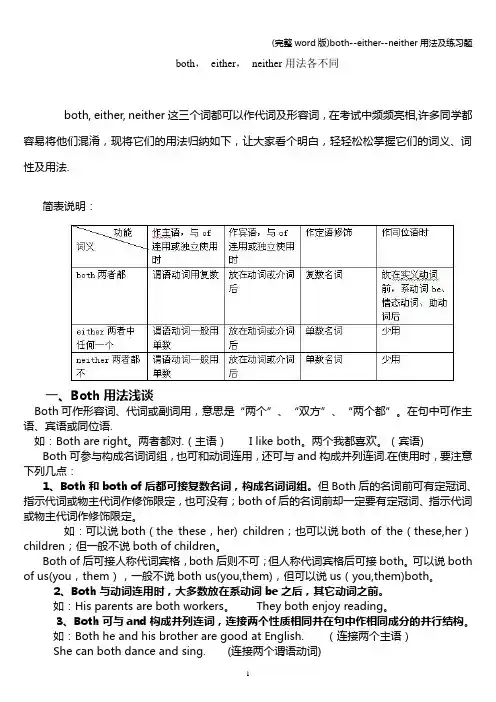
both,either,neither用法各不同both, either, neither这三个词都可以作代词及形容词,在考试中频频亮相,许多同学都容易将他们混淆,现将它们的用法归纳如下,让大家看个明白,轻轻松松掌握它们的词义、词性及用法.简表说明:一、Both用法浅谈Both可作形容词、代词或副词用,意思是“两个”、“双方”、“两个都”。
在句中可作主语、宾语或同位语.如:Both are right。
两者都对.(主语)I like both。
两个我都喜欢。
(宾语)Both可参与构成名词词组,也可和动词连用,还可与and构成并列连词.在使用时,要注意下列几点:1、Both和both of后都可接复数名词,构成名词词组。
但Both后的名词前可有定冠词、指示代词或物主代词作修饰限定,也可没有;both of后的名词前却一定要有定冠词、指示代词或物主代词作修饰限定。
如:可以说both(the these,her) children;也可以说both of the(these,her)children;但一般不说both of children。
Both of后可接人称代词宾格,both后则不可;但人称代词宾格后可接both。
可以说both of us(you,them),一般不说both us(you,them),但可以说us(you,them)both。
2、Both与动词连用时,大多数放在系动词be之后,其它动词之前。
如:His parents are both workers。
They both enjoy reading。
3、Both可与and构成并列连词,连接两个性质相同并在句中作相同成分的并行结构。
如:Both he and his brother are good at English. (连接两个主语)She can both dance and sing. (连接两个谓语动词)Mary is both kind and beautiful。
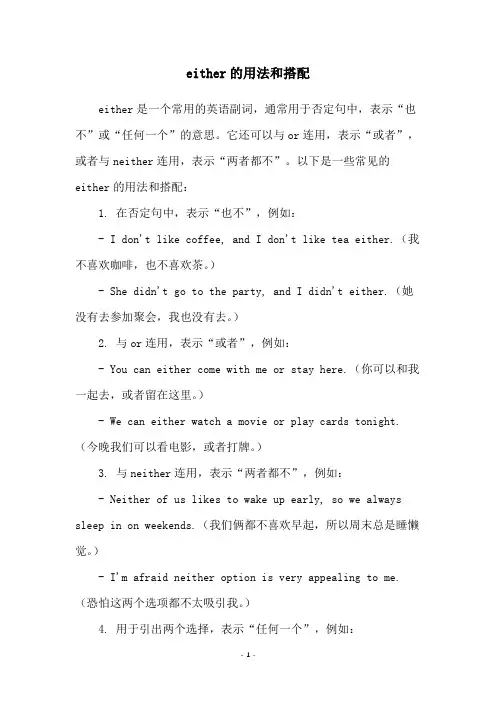
either的用法和搭配either是一个常用的英语副词,通常用于否定句中,表示“也不”或“任何一个”的意思。
它还可以与or连用,表示“或者”,或者与neither连用,表示“两者都不”。
以下是一些常见的either的用法和搭配:1. 在否定句中,表示“也不”,例如:- I don't like coffee, and I don't like tea either.(我不喜欢咖啡,也不喜欢茶。
)- She didn't go to the party, and I didn't either.(她没有去参加聚会,我也没有去。
)2. 与or连用,表示“或者”,例如:- You can either come with me or stay here.(你可以和我一起去,或者留在这里。
)- We can either watch a movie or play cards tonight.(今晚我们可以看电影,或者打牌。
)3. 与neither连用,表示“两者都不”,例如:- Neither of us likes to wake up early, so we always sleep in on weekends.(我们俩都不喜欢早起,所以周末总是睡懒觉。
)- I'm afraid neither option is very appealing to me.(恐怕这两个选项都不太吸引我。
)4. 用于引出两个选择,表示“任何一个”,例如:- You can take either route to get to the store.(你可以走任何一条路线去商店。
)- You can have either the chicken or the fish for dinner.(晚餐你可以选择鸡肉或鱼肉。
)总之,either是一个非常常用的副词,掌握了它的正确用法和搭配,可以帮助我们更加流利地表达自己的意思。
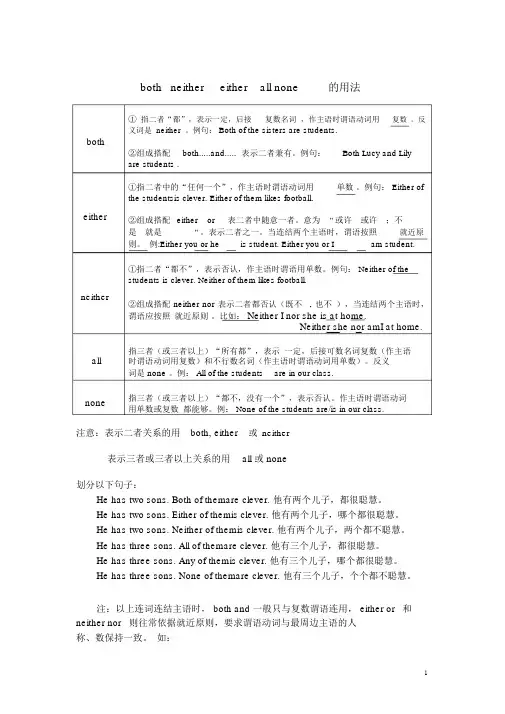
both either neitherall noneboth neither either all none的用法① 指二者“都”,表示一定,后接复数名词,作主语时谓语动词用复数。
反义词是 neither 。
例句:Both of the sisters are students.②组成搭配both.....and..... 表示二者兼有。
例句:Both Lucy and Lilyare students .①指二者中的“任何一个”,作主语时谓语动词用单数。
例句: Either of the studentsis clever. Either of them likes football.②组成搭配either or表二者中随意一者。
意为" 或许或许;不是就是" 。
表示二者之一。
当连结两个主语时,谓语按照就近原则。
例:Either you or he is student. Either you or I am student.①指二者“都不”,表示否认,作主语时谓语用单数。
例句: Neither of the students is clever. Neither of them likes football.②组成搭配 neither nor 表示二者都否认(既不 , 也不),当连结两个主语时,谓语应按照就近原则。
比如: Neither I nor she is at home.Neither she nor amI at home.指三者(或三者以上)“所有都”,表示一定,后接可数名词复数(作主语时谓语动词用复数)和不行数名词(作主语时谓语动词用单数)。
反义词是 none 。
例: All of the students are in our class.指三者(或三者以上)“都不,没有一个”,表示否认。
作主语时谓语动词用单数或复数都能够。
例: None of the students are/is in our class.注意:表示二者关系的用both, either或neither表示三者或三者以上关系的用all 或 none划分以下句子:He has two sons. Both of themare clever. 他有两个儿子,都很聪慧。
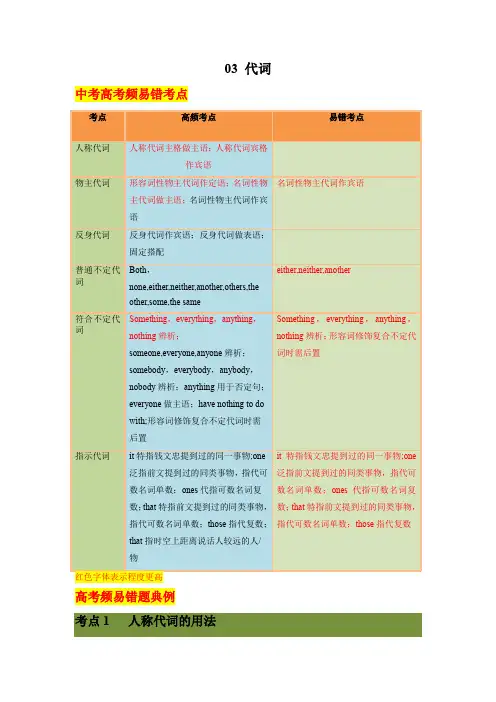
03 代词中考高考频易错考点高考频易错题典例考点1 人称代词的用法We decide to make a rule for us room-mates to turn off the lights at 10:30 p.m.A.thatB.thisC.itD.one错因分析:易错选A.忽视it作形式宾语的用法。
正确解答:C 句意为:“我们寝室决定把晚上十点半熄灯定为一个规定。
”空格处为形式宾语,真正的宾语为其后的不定式短语,故选it.考点2 物主代词的用法I don't like watch.I like .A.me;yourB.my;yourC.me;yoursD.my;yours错因分析:易错选B.未掌握形容词性物主代词与名词性物主代词的区别。
正确解答:D 句意为:“我不喜欢我的手表。
我喜欢你的(手表)。
”两个空均表示所有关系,所以用物主代词。
第一空修饰名词watch,用形容词性物主代词;第二空用名词性物主代词yours,作动词like的宾语,相当于your watch.考点3 反身代词的用法-Judy and I will go to the beach tomorrow.-It's so nice.Enjoy .A.yourselvesB.yourselfC.herself错因分析:易错选B.忽视Judy and I表示复数概念。
正确解答:A enjoy oneself为固定短语,意为“玩得开心”,又由Judy and I可知,是两个人,因此反身代词应用复数形式。
考点4 不定代词的用法1.My host family tried to cook for me when I studied in New Zealand.A.different somethingB.different anythingC.something differentD.anything different错因分析:易错选A.未掌握形容词修饰不定代词的用法。
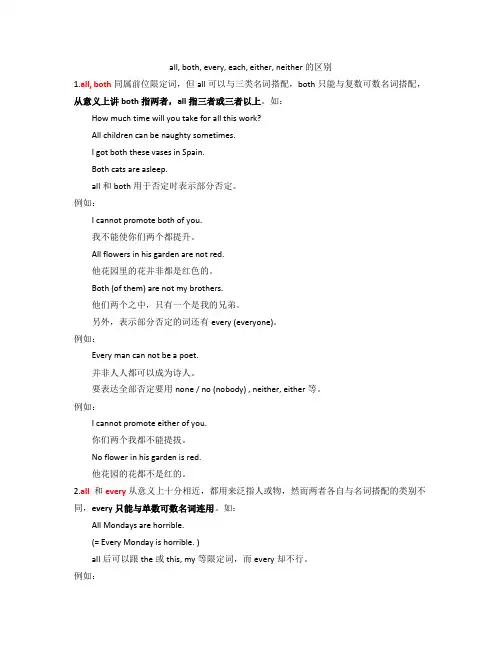
all, both, every, each, either, neither的区别1.all, both同属前位限定词,但all可以与三类名词搭配,both只能与复数可数名词搭配,从意义上讲both指两者,all指三者或三者以上。
如:How much time will you take for all this work?All children can be naughty sometimes.I got both these vases in Spain.Both cats are asleep.all和both用于否定时表示部分否定。
例如:I cannot promote both of you.我不能使你们两个都提升。
All flowers in his garden are not red.他花园里的花并非都是红色的。
Both (of them) are not my brothers.他们两个之中,只有一个是我的兄弟。
另外,表示部分否定的词还有every (everyone)。
例如:Every man can not be a poet.并非人人都可以成为诗人。
要表达全部否定要用none / no (nobody) , neither, either等。
例如:I cannot promote either of you.你们两个我都不能提拔。
No flower in his garden is red.他花园的花都不是红的。
2.all和every从意义上十分相近,都用来泛指人或物,然而两者各自与名词搭配的类别不同,every只能与单数可数名词连用。
如:All Mondays are horrible.(= Every Monday is horrible. )all后可以跟the或this, my等限定词,而every却不行。
例如:All the boys of this class are able to run faster than their teacher.试比较:She was here all day.她在这里呆了一整天。
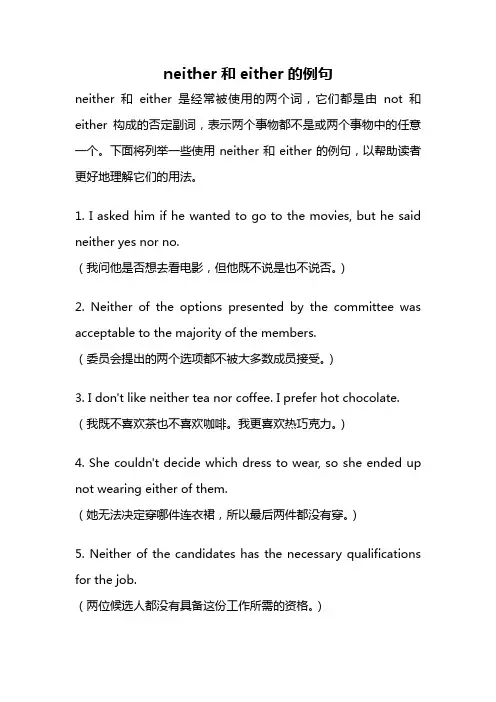
neither和either的例句neither和either是经常被使用的两个词,它们都是由not和either构成的否定副词,表示两个事物都不是或两个事物中的任意一个。
下面将列举一些使用neither和either的例句,以帮助读者更好地理解它们的用法。
1. I asked him if he wanted to go to the movies, but he said neither yes nor no.(我问他是否想去看电影,但他既不说是也不说否。
)2. Neither of the options presented by the committee was acceptable to the majority of the members.(委员会提出的两个选项都不被大多数成员接受。
)3. I don't like neither tea nor coffee. I prefer hot chocolate.(我既不喜欢茶也不喜欢咖啡。
我更喜欢热巧克力。
)4. She couldn't decide which dress to wear, so she ended up not wearing either of them.(她无法决定穿哪件连衣裙,所以最后两件都没有穿。
)5. Neither of the candidates has the necessary qualifications for the job.(两位候选人都没有具备这份工作所需的资格。
)6. I can't go to the party on Saturday, and I can't go on Sunday either.(我不能在星期六去参加派对,星期天也不行。
)7. He didn't want either of the two desserts, so he asked for a bowl of fruit instead.(他两种甜点都不想要,所以他要求换成一碗水果。

either...or和neither...nor..的用法讲解"either...or..." 和"neither...nor..." 是英语中用来表达两个选择之间的关系的结构,它们具有相似的语法结构,但用法略有不同。
下面是它们的用法讲解:"either...or...":用法:"either...or..." 用于表示两个选择中的一个或另一个,意味着其中一个选择会发生。
例句:"You can either have coffee or tea."(你可以选择咖啡或茶。
)"Either you finish the project today, or you work on it tomorrow."(你要么今天完成这个项目,要么明天继续工作。
)"neither...nor...":用法:"neither...nor..." 用于表示两个选择都不成立,表示否定或排除。
例句:"I neither like math nor enjoy science."(我既不喜欢数学,也不喜欢科学。
)"Neither my sister nor my brother will attend the party."(我姐妹和我兄弟都不会参加聚会。
)需要注意的是,这两个结构通常用于否定句或疑问句,用于强调选择或排除。
此外,"either...or..." 和"neither...nor..." 也可以用于肯定句中,但在这种情况下,它们强调了选择的特殊性,例如:"She is both intelligent and hardworking." (她既聪明又勤奋。
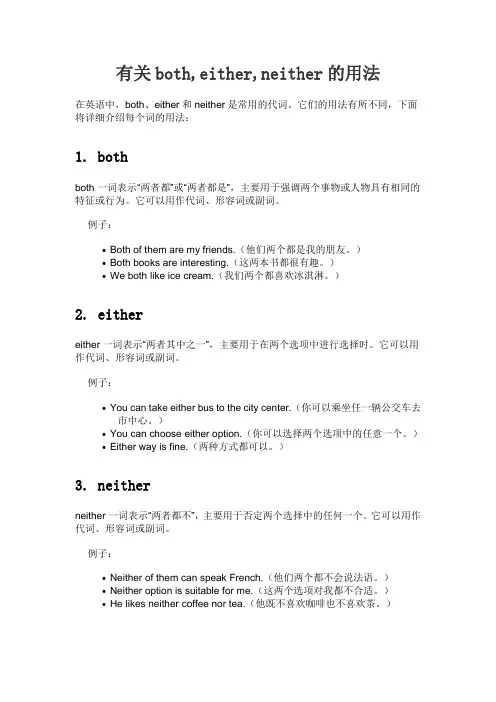
有关both,either,neither的用法在英语中,both、either和neither是常用的代词。
它们的用法有所不同,下面将详细介绍每个词的用法:1. bothboth一词表示“两者都”或“两者都是”,主要用于强调两个事物或人物具有相同的特征或行为。
它可以用作代词、形容词或副词。
例子:•Both of them are my friends.(他们两个都是我的朋友。
)•Both books are interesting.(这两本书都很有趣。
)•We both like ice cream.(我们两个都喜欢冰淇淋。
)2. eithereither一词表示“两者其中之一”,主要用于在两个选项中进行选择时。
它可以用作代词、形容词或副词。
例子:•You can take either bus to the city center.(你可以乘坐任一辆公交车去市中心。
)•You can choose either option.(你可以选择两个选项中的任意一个。
)•Either way is fine.(两种方式都可以。
)3. neitherneither一词表示“两者都不”,主要用于否定两个选择中的任何一个。
它可以用作代词、形容词或副词。
例子:•Neither of them can speak French.(他们两个都不会说法语。
)•Neither option is suitable for me.(这两个选项对我都不合适。
)•He likes neither coffee nor tea.(他既不喜欢咖啡也不喜欢茶。
)。
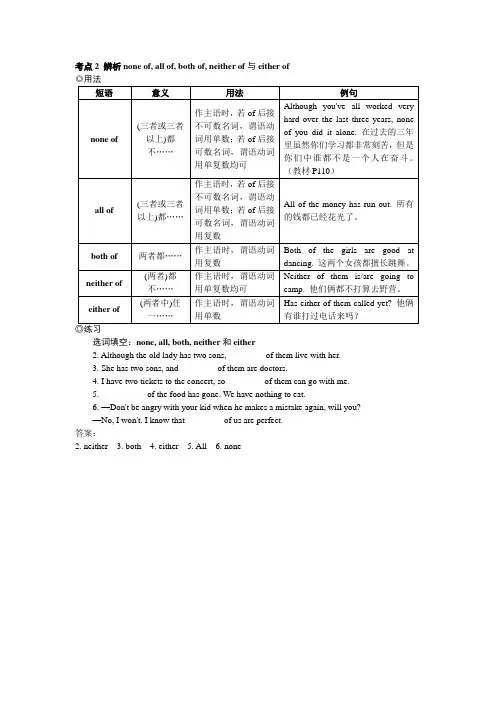
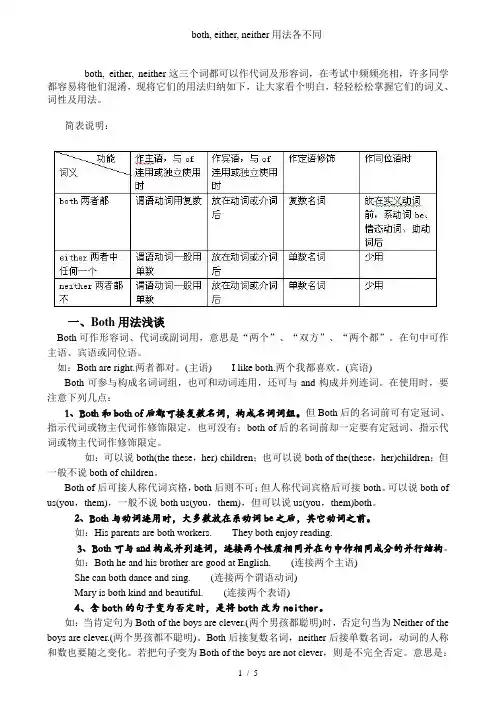
both, either, neither用法各不同both, either, neither这三个词都可以作代词及形容词,在考试中频频亮相,许多同学都容易将他们混淆,现将它们的用法归纳如下,让大家看个明白,轻轻松松掌握它们的词义、词性及用法。
简表说明:一、Both用法浅谈Both可作形容词、代词或副词用,意思是“两个”、“双方”、“两个都”。
在句中可作主语、宾语或同位语。
如:Both are right.两者都对。
(主语)I like both.两个我都喜欢。
(宾语)Both可参与构成名词词组,也可和动词连用,还可与and构成并列连词。
在使用时,要注意下列几点:1、Both和both of后都可接复数名词,构成名词词组。
但Both后的名词前可有定冠词、指示代词或物主代词作修饰限定,也可没有;both of后的名词前却一定要有定冠词、指示代词或物主代词作修饰限定。
如:可以说both(the these,her) children;也可以说both of the(these,her)children;但一般不说both of children。
Both of后可接人称代词宾格,both后则不可;但人称代词宾格后可接both。
可以说both of us(you,them),一般不说both us(you,them),但可以说us(you,them)both。
2、Both与动词连用时,大多数放在系动词be之后,其它动词之前。
如:His parents are both workers. They both enjoy reading.3、Both可与and构成并列连词,连接两个性质相同并在句中作相同成分的并行结构。
如:Both he and his brother are good at English.(连接两个主语)She can both dance and sing.(连接两个谓语动词)Mary is both kind and beautiful.(连接两个表语)4、含both的句子变为否定时,是将both改为neither。
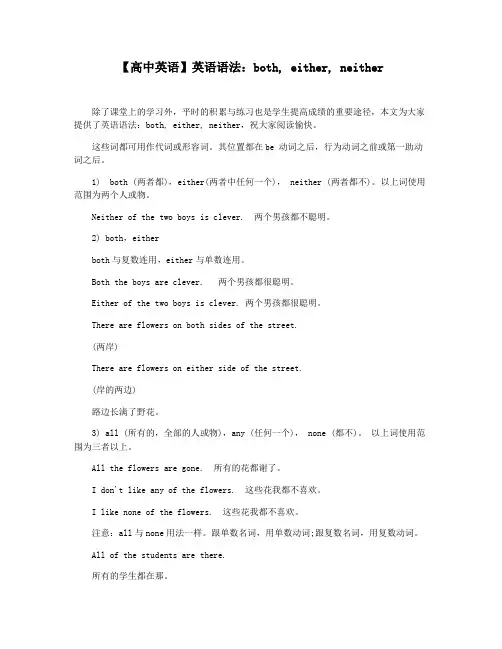
【高中英语】英语语法:both, either, neither除了课堂上的学习外,平时的积累与练习也是学生提高成绩的重要途径,本文为大家提供了英语语法:both, either, neither,祝大家阅读愉快。
这些词都可用作代词或形容词。
其位置都在be 动词之后,行为动词之前或第一助动词之后。
1) both (两者都),either(两者中任何一个), neither (两者都不)。
以上词使用范围为两个人或物。
Neither of the two boys is clever. 两个男孩都不聪明。
2) both,eitherboth与复数连用,either与单数连用。
Both the boys are clever. 两个男孩都很聪明。
Either of the two boys is clever. 两个男孩都很聪明。
There are flowers on both sides of the street.(两岸)There are flowers on either side of the street.(岸的两边)路边长满了野花。
3) all (所有的,全部的人或物),any (任何一个), none (都不)。
以上词使用范围为三者以上。
All the flowers are gone. 所有的花都谢了。
I don't like any of the flowers. 这些花我都不喜欢。
I like none of the flowers. 这些花我都不喜欢。
注意:all与none用法一样。
跟单数名词,用单数动词;跟复数名词,用复数动词。
All of the students are there.所有的学生都在那。
All (of) the milk is there.所有的牛奶都在那。
以上就是为大家整理的英语语法:both, either, neither,希望同学们阅读后会对自己有所帮助,祝大家阅读愉快。
Each和Every,Either和Neither都是很容易混淆的词,也是考试中常遇到的考点,更是同学们感到迷惑容易失分的地方。
其实只要掌握了基本用法和常用句型,还是很好区分的。
下面结合例句谈谈这几个词的用法。
前两个都表示每一个,每个的,各自的,区分起来有点难度;Either是或者……或者……,neither是两者都不……。
These distributive words are normally used with singular nouns, and are placed before thenoun.这些词通常与单数名词连用,并放在名词之前。
Each, either and neither can be used with plural nouns but must be followed by of.Each, either 和neither 与复数连用时后面必须接 of。
Each is a way of seeing the members of a group as individuals.Each是针对整体中的每个个体而言。
Each child received a present./Each of the children received a present.每个孩子都可以得到一份礼物。
Every is a way of seeing a group as a series of members.Every是针对整体中的一系列成员而言。
Every child in the world deserves affection.全世界的孩子都应该受到爱护。
It can also express different points in a series, especially with time expressions.尤其在时间的表达上,every也可以表示一系列不同的点。
Every third morning John goes jogging.每隔三天约翰都要早起跑步。
中考考点点击(either 和 neither)
一、either
1、用作代词,意为“两个人或事物中的任何一个”,在句中作主语、宾语等。
either单独或与of短语连用作主语是,谓语动词常用单数形式。
如:
―― Do you know either of his parents?
――No, I don’t know either (of them).
―― Has either of your parents visited you?
2、用作形容词,意为“两个中的任何一个(的)”,用于没有冠词、物主代词、指示代词等修饰的单数名词或代词前作定语,谓语动词要用单数形式。
如:
You can do it in either way.
此外,either作形容词时,还可指“两个都”,常用于end 和 side 前面作定语。
如:There are shops on either side (= both side) of the street.
3、作连词时,常与or 连用,构成短语“either…or…”,在句中起并列连词的作用,且所连接的成分必须相同。
若连接并列主语,通常要求谓语动词与最邻近的主语在人称和数上保持一致,这就是我们通常说的"就近原则。
如:
――Either he or you are wrong= Either you or he is wrong.
――Are either you or I going there tomorrow? 明天是你还是我去那里?
――Either you or he has lunch at school.
其一般疑问句应为:Do either you or he have lunch at school? 是你还是他在学校吃午饭?
若要对either...or...句型进行否定时,只需把either...or...换成neither...nor...即可。
例如:
Either you or she is good at drawing. 变为否定句应为:Neither you nor she is good at drawing. 你和她都不擅长绘画。
4、作为副词,意为“也”,用于否定句或否定词组后加强语气。
常放在句尾,作状语。
如:She doesn’t like it. I don’t like it, either. I f you do not go, I shall not either. either...or...意为"或者……或者……;不是……就是……"之意。
表示两者之一,连接句子中两个并列的成分。
例如:
When the girl is happy, she either sings or dances. 那个女孩高兴时,不是唱就是跳。
(此句中either...or...连接两个动词,因为主语是单数第三人称,谓语动词要用其相应的形式。
)
二.neither
1.作副词,意为“也不”
――You don't like this book. Neither do I. 你不喜欢这本书, 我也不喜欢。
――I don't know that neither. 那个我也不知道。
2.作形容词,与单数名词或代词连用]即非此又非彼的; (两者)都不的
――Neither statement is true. (=Neither of the statements is true.)两种说法都不正确。
――On neither side of the street are there any trees. 街道两旁都没有什么树木。
--Neither book is satisfactory. 两本书都不令人满意.
3.作代词,意为二者都不
――Neither was satisfactory. 二者都不使人满意。
――I like neither. 我两个都不喜欢。
4.作连词,常用neither...nor...表示"既不……也不……"。
其含义是否定的,可连接任意两个并列的成份。
例如:
He likes neither cheese nor butter. 她既不喜欢乳酪也不喜欢黄油。
在这句中neither...nor...连接两个宾语。
当neither...nor...连接两个主语时,应遵循"就近原则"。
例如:
Neither Bob nor Tom is at home today. 今天胞勃和汤母都不在家。
如果把neither...nor...句型变为肯定句,只需把neither...nor...改为both...and...即可,同时谓语动词必须用复数形式。
例如:
neither或nor还有另外一种用法,就是当表达一个人没有做某事,另一个人也没做同一类事时,可用neither或nor进行简略回答,其结构为:Neither / Nor+助动词 / 情态动词 / be动词+主语。
例如:
She doesn't go to school by bus. Neither / Nor do I. 他不是乘公交车去上学,我也不是。
They didn't go to the park yesterday. Neither / Nor did we. 昨天他们没去公园,我们也没去。